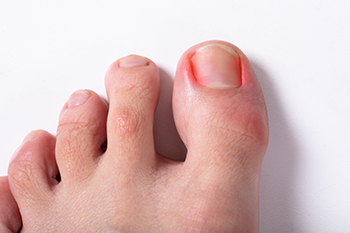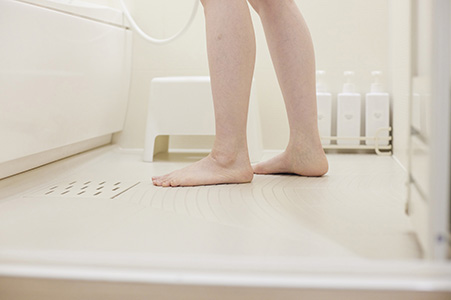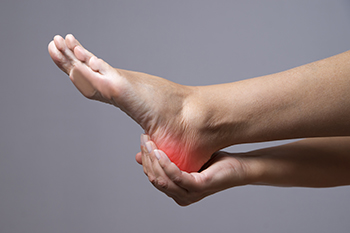
Ingrown toenails develop when the edge of a toenail grows into the surrounding skin, causing pain, redness, and swelling. Common causes include improper nail trimming, wearing tight shoes, injury to the toe, or genetic predisposition. The big toe is most often affected. Symptoms can range from mild discomfort to severe pain, especially when pressure is applied. The area may also become warm, tender, and even infected, leading to pus and increased swelling. Many describe the sensation as a constant, throbbing ache that worsens when walking or wearing shoes. Some treatments can help with mild cases, but more persistent or infected ingrown toenails require professional care. A podiatrist can safely remove the ingrown portion of the nail, treat any infection, and provide guidance to prevent future occurrences. In recurring cases, a minor procedure may be performed to prevent the nail from growing inward again. If you have a painful ingrown toenail, it is suggested that you schedule an appointment with a podiatrist.
Ingrown toenails may initially present themselves as a minor discomfort, but they may progress into an infection in the skin without proper treatment. For more information about ingrown toenails, contact Kent DiNucci, DPM of Ankle and Foot Clinic . Our doctor can provide the care you need to keep you pain-free and on your feet.
Ingrown Toenails
Ingrown toenails are caused when the corner or side of a toenail grows into the soft flesh surrounding it. They often result in redness, swelling, pain, and in some cases, infection. This condition typically affects the big toe and may recur if it is not treated properly.
Causes
- Improper toenail trimming
- Genetics
- Improper shoe fitting
- Injury from pedicures or nail picking
- Abnormal gait
- Poor hygiene
You are more likely to develop an ingrown toenail if you are obese, have diabetes, arthritis, or have any fungal infection in your nails. Additionally, people who have foot or toe deformities are at a higher risk of developing an ingrown toenail.
Symptoms
Some symptoms of ingrown toenails are redness, swelling, and pain. In rare cases, there may be a yellowish drainage coming from the nail.
Treatment
Ignoring an ingrown toenail can have serious complications. Infections of the nail border can progress to a deeper soft-tissue infection, which can then turn into a bone infection. You should always speak with your podiatrist if you suspect you have an ingrown toenail, especially if you have diabetes or poor circulation.
If you have any questions, please feel free to contact our office located in Omaha, NE . We offer the newest diagnostic and treatment technologies for all your foot care needs.

Toenail fungal infections, also known as onychomycosis, can cause nails to become thickened, discolored, brittle, or crumbly. The condition often starts as a small white or yellow spot under the nail and gradually spreads. It is commonly caused by fungi that thrive in warm, moist environments like locker rooms, sweaty shoes, or around public pools. While not usually painful in early stages, untreated infections can worsen and lead to discomfort, spreading to other nails or even surrounding skin. Diagnosis involves examining the nail and possibly sending a sample to a lab for confirmation. Treatment options include topical antifungal medications, oral prescriptions, or laser therapy. Because fungal infections can be difficult to eliminate and may return without proper care, early and consistent treatment is important. If you notice changes in your toenails or suspect an infection, it is suggested that you see a podiatrist for proper diagnosis and appropriate treatment.
For more information about treatment, contact Kent DiNucci, DPM of Ankle and Foot Clinic . Our doctor can provide the care you need to keep you pain-free and on your feet.
Toenail Fungus Treatment
Toenail fungus is a condition that affects many people and can be especially hard to get rid of. Fortunately, there are several methods to go about treating and avoiding it.
Antifungals & Deterrence
Oral antifungal medicine has been shown to be effective in many cases. It is important to consult with a podiatrist to determine the proper regiment for you, or potentially explore other options.
Applying foot powder on the feet and shoes helps keep the feet free of moisture and sweat.
Sandals or open toed shoes – Wearing these will allow air movement and help keep feet dry. They also expose your feet to light, which fungus cannot tolerate. Socks with moisture wicking material also help as well.
If you have any questions please feel free to contact our office located in Omaha, NE . We offer the newest diagnostic tools and technology to treat your foot and ankle needs.

Plantar heel pain can make even simple movements feel difficult. It often starts as a sharp ache in the bottom of the heel, especially when taking the first steps in the morning or after resting. This kind of pain can limit walking, standing, and daily routines, affecting your ability to work, exercise, or enjoy time with others. Over time, the discomfort may lead to less activity, poor sleep, and changes in mood. Many people try to ignore the pain, but without treatment, it can linger or get worse. Wearing supportive shoes, stretching, resting and other treatments can help ease the symptoms. A podiatrist can guide you toward the most effective options to improve your comfort and keep you moving. If you have plantar heel pain, it is suggested that you see a podiatrist for relief options.
Many people suffer from bouts of heel pain. For more information, contact Kent DiNucci, DPM of Ankle and Foot Clinic . Our doctor can provide the care you need to keep you pain-free and on your feet.
Causes of Heel Pain
Heel pain is often associated with plantar fasciitis. The plantar fascia is a band of tissues that extends along the bottom of the foot. A rip or tear in this ligament can cause inflammation of the tissue.
Achilles tendonitis is another cause of heel pain. Inflammation of the Achilles tendon will cause pain from fractures and muscle tearing. Lack of flexibility is also another symptom.
Heel spurs are another cause of pain. When the tissues of the plantar fascia undergo a great deal of stress, it can lead to ligament separation from the heel bone, causing heel spurs.
Why Might Heel Pain Occur?
- Wearing ill-fitting shoes
- Wearing non-supportive shoes
- Weight change
- Excessive running
Treatments
Heel pain should be treated as soon as possible for immediate results. Keeping your feet in a stress-free environment will help. If you suffer from Achilles tendonitis or plantar fasciitis, applying ice will reduce the swelling. Stretching before an exercise like running will help the muscles. Using all these tips will help make heel pain a condition of the past.
If you have any questions please contact our office located in Omaha, NE . We offer the newest diagnostic and treatment technologies for all your foot and ankle needs.

